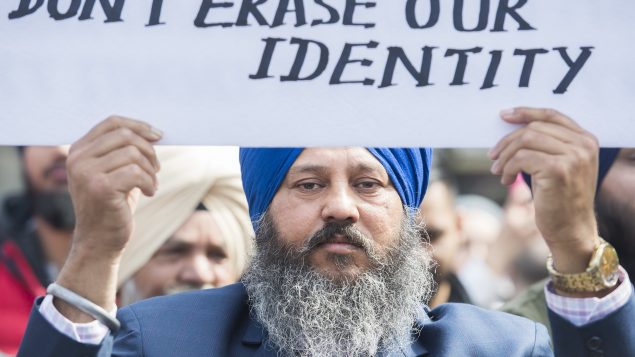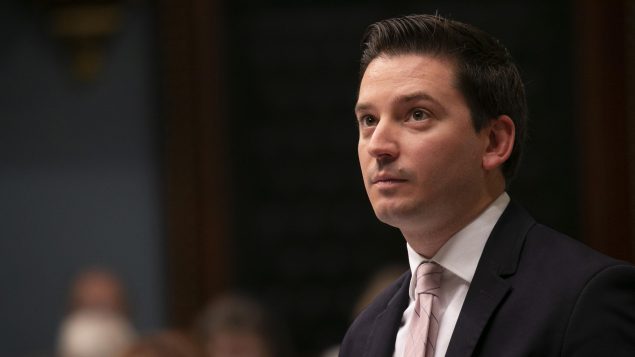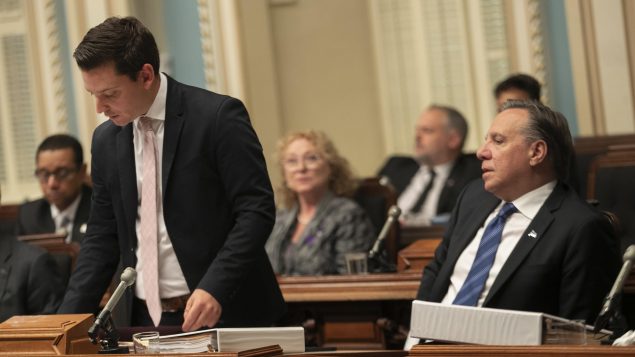Quebec’s provincial legislature adopted a controversial law late Sunday that bans certain public servants, including teachers, police officers, prosecutors and judges, from wearing religious symbols at work.
The legislation known as Bill 21 also forbids anyone giving or receiving a state service with their face covered — largely seen as a measure targeting full-face Islamic veils.
Premier Francois Legault’s centre-right Coalition Avenir Quebec (CAQ) government used its majority and the support of the separatist Parti Quebecois to push through Bill 21 after a marathon weekend of deliberations at Quebec’s National Assembly.
The CAQ had to resort to a rarely used parliamentary mechanism called closure, which limits the opposition’s ability to debate proposed legislation, to speed up the passing of its two flagship legislative projects: an immigration reform, known as Bill 9, and the secularism bill.
Bill 21, passed with a vote of 73-35 at around 10:30 p.m. ET Sunday.
The centrist Quebec Liberal Party and the separatist centre-left Quebec solidaire voted against the bill.
‘Wrong and profoundly unjust’

A man holds up a sign during a demonstration in Montreal, Sunday, April 7, 2019, in opposition to the Quebec government’s newly tabled Bill 21. (Graham Hughes/THE CANADIAN PRESS)
Critics of Bill 21 argue the law targets religious minorities while the government says it affirms and preserves the secular identity of Quebec.
“In no way does [state] secularism mean the banning of religious symbols,” said Liberal secularism critic Hélène David.
The legislation is wrong and “profoundly unjust,” David added.
“It will prevent employment access to women and men who are qualified,” David said before Sunday’s vote. “Unjust because some women will have to make a choice between a promotion, their career and a profound and sincere conviction.”
First in Canada

Immigration Minister Simon Jolin-Barrette asked all legislators to “convey the principles of state secularism with calm and respect.” (Ivanoh Demers/Radio-Canada)
Quebec Immigration Minister, Simon Jolin-Barrette said the legislation, which codifies the principles of secularism and laicity in law, is a first for Canada and Quebec.
“What we’re doing is really important,” Jolin-Barrette said.
The Legault government introduced last-minute amendments toughening the law, making provisions for a minister to verify that it is being obeyed and to demand corrective measures if necessary.
Liberal member Marc Tanguay said the changes would result in a “secularism police.”
Legislation includes notwithstanding clause
The legislation pre-emptively invokes Section 33 of the Canadian Constitution, known as the notwithstanding clause, which allows federal, provincial or territorial governments to temporarily override, or bypass, certain rights guaranteed by the Canadian Charter of Rights and Freedoms.
The use of the notwithstanding clause means that the bill is inoculated against court challenges on grounds it violates fundamental freedoms granted by law.
However, Section 33 overrides can last only five years, when they are subject to renewal. And the Liberals vowed Sunday not to renew the notwithstanding clause if elected to government.
Reforming immigration
Bill 21 was the second law debated and passed over the weekend. In a 62 to 42 vote, the government used its majority around 4 a.m. Sunday to push through Bill 9, which reforms the province’s immigration system.
Jolin-Barrette’s bill gives the province more authority over who receives permanent residency in the province. The government says the new selection criteria will permit it to fast-track newcomers who better meet the needs of employers. Applicants in the old system were selected on a first-come, first-served basis.
The bill is controversial because it creates a legal framework that allows the government to force newly arrived immigrants to pass a French-language and so-called values test before becoming eligible for permanent residency.
While specific wording on the two proposed tests isn’t included in the bill, the legislation permits the province to institute the tests by way of regulation.
Also contentious is the provision in Bill 9 permitting the government to cancel roughly 16,000 immigration applications — some from people who have waited in limbo for years as their files languished under the old system. Those applicants will have to start the process over again.
Support from business groups
The federation of Quebec’s chambers of commerce saluted the bill’s passing early Sunday.
“The concerted efforts of the government will lead to a better link between the skills of immigrants and those required for positions to fill in Quebec companies,” the federation’s president, Stephane Forget, said in a statement.
“These changes will have a very important impact to facilitate the recruitment of future employees … and therefore, better integration of immigrants.”
With files from The Canadian Press and CBC News







For reasons beyond our control, and for an undetermined period of time, our comment section is now closed. However, our social networks remain open to your contributions.